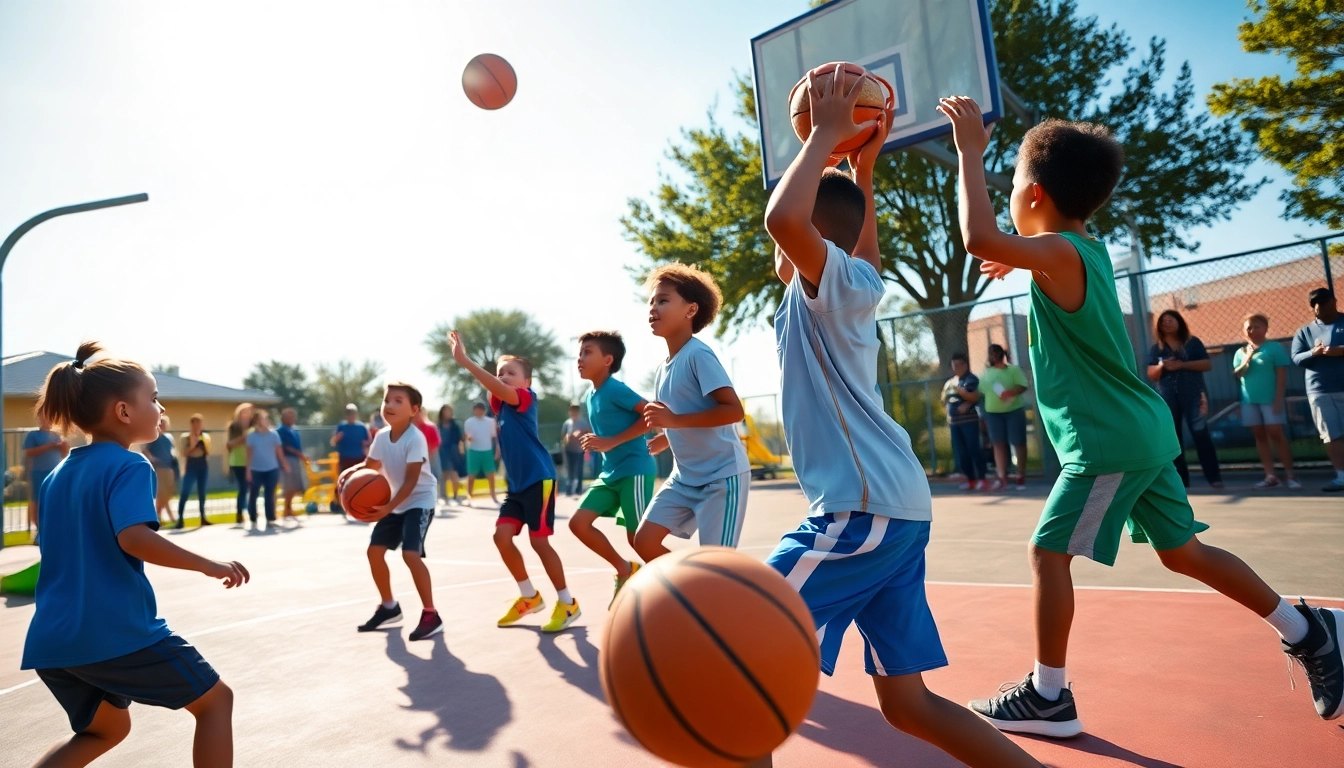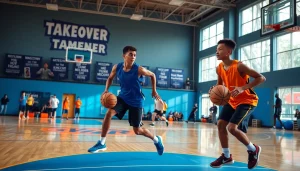Engaging Activities for Young Basketball Enthusiasts: Skills, Strategies, and Community
Introduction to Young Basketball Enthusiasts
Basketball, with its fast-paced action and team dynamics, has become one of the most beloved sports among youth. It fosters not only physical fitness but also a sense of community and personal development. For young basketball enthusiasts, embracing the sport can be a transformative experience. In this article, we delve into the significance of youth basketball, the skills and techniques essential for aspiring players, and how to create a supportive environment for their growth both on and off the court.
The Importance of Youth Basketball
Basketball serves as a powerful tool for youth development. Engaging in this sport allows children to cultivate physical skills, discipline, and teamwork. Teams and leagues provide a structured environment where young players can learn the nuances of the game while forging friendships and developing confidence. This communal aspect also emphasizes sportsmanship, teaching young athletes to respect opponents and their teammates alike.
Benefits of Playing Basketball for Kids
- Physical Health: Regular participation in basketball enhances cardiovascular fitness, strength, and coordination.
- Mental Toughness: The sport challenges players to push through adversity, helping foster resilience and determination.
- Social Skills: Team interactions develop communication and collaboration skills, essential for personal and professional relationships in the future.
- Skill Development: Mastering basketball fundamentals establishes a strong foundation that benefits players across various other sports.
- Enjoyment and Stress Relief: Playing basketball can be a fun way to relieve stress and enjoy physical activity.
Overview of Essential Skills to Learn
For young players, cultivating a well-rounded skill set is critical for success on the basketball court. Beginning with basic skills such as dribbling, passing, and shooting, athletes can build upon these foundations through practice and instruction. Moreover, understanding tactical elements of the game, such as defensive positioning and offensive strategies, is essential as they progress in their basketball journey.
Skills Development for Aspiring Players
Fundamentals of Dribbling and Shooting
Dribbling and shooting are fundamental skills that every young basketball player must master. Effective dribbling allows players to navigate the court and create opportunities for themselves and their teammates. Young players should focus on:
- Using both hands for dribbling to become more versatile.
- Maintaining a low center of gravity for better balance and control.
- Practicing various dribbling moves, such as crossover and behind-the-back dribbles.
Shooting techniques also play a crucial role in a player’s success. Essentials to focus on include:
- Proper hand positioning on the basketball.
- Foot placement and balance before the shot.
- Follow-through to ensure accuracy and consistency.
Passing Techniques for Team Play
Passing is vital in basketball, emphasizing teamwork over individual success. Young players should learn various passing techniques, such as:
- Chest Pass: A straightforward pass used for short distances, ensuring accuracy while maintaining good posture.
- Bounce Pass: Effective for getting the ball past defenders while maintaining a low trajectory.
- Overhead Pass: Useful for longer distances or when passing over defenders.
Practicing these techniques in drills allows players to develop their coordination and understanding of timing with their teammates.
Defensive Strategies for Young Players
Defensive skills are just as important as offensive skills. Young basketball enthusiasts should focus on understanding positioning and how to anticipate the opponent’s moves. Key concepts include:
- Staying in a defensive stance to maintain balance and readiness.
- Preventing the offensive player from driving towards the basket.
- Learning how to contest shots without fouling.
Encouraging young players to engage in one-on-one defensive drills can significantly improve their skill levels while solidifying the importance of individual responsibility on defense.
Creating a Supportive Environment
The Role of Coaches and Mentors
Coaches play a pivotal role in shaping the experiences of young basketball enthusiasts. A supportive coach should:
- Provide constructive feedback to foster improvement while maintaining a positive atmosphere.
- Set realistic goals that challenge players without overwhelming them.
- Encourage a growth mindset by emphasizing effort and progress over immediate success.
Mentorship can extend beyond skills training; coaches should also help players develop life skills such as handling pressure and working through setbacks.
Engaging Parents in the Basketball Journey
Parents play a crucial role in a child’s sports involvement. Engaging them in their child’s basketball journey can enhance motivation and commitment. Tips for engagement include:
- Encouraging attendance at practices and games to show support.
- Providing positive reinforcement and acting as emotional support during competitions.
- Facilitating communication between coaches and players to bridge the gap when needed.
By creating an inclusive environment for parents, coaches can significantly enhance the overall experience for young athletes.
Building Community through Local Leagues
Local basketball leagues are excellent platforms for aspiring players to experience structured competition. Such leagues provide an opportunity for young enthusiasts to play regularly, learn teamwork, and build friendships. Establishing connections within the community helps players develop a sense of belonging and allows them to enjoy the camaraderie that comes with being part of a team.
Moreover, community leagues are often more accessible than travel teams, making it easier for children from various backgrounds to participate. Coaches and league organizers should prioritize inclusivity and strive to foster a welcoming atmosphere for all young participants.
Fun Activities and Drills for Training
Creative Drills to Enhance Skills
Incorporating fun drills into practices can keep young players engaged while also improving their skills. Here are some creative drills:
- Dribble Tag: A fun game where players must dribble while trying to tag each other, enhancing their dribbling skills and agility.
- Shooting Contests: Setting up shooting competitions can motivate players to improve their shooting while adding an element of friendly competition.
- Relay Races: Incorporating relay races that require dribbling and passing can enhance speed and teamwork among young athletes.
These activities make learning enjoyable, ensuring that players look forward to their training sessions.
Games that Teach Strategy and Teamwork
Beyond physical skills, games offer valuable lessons in strategy and teamwork. Small-sided games like 3-on-3 can help players focus on court spacing, ball movement, and communication. These formats encourage young players to make decisions quickly and work cohesively with their team.
Additionally, strategy games that analyze real basketball scenarios can develop critical thinking skills. For example, discussing different plays and their outcomes can provide insight into effective game strategies, while still keeping the learning environment dynamic and interactive.
Organizing Community Basketball Events
Community events offer an excellent way to engage young basketball enthusiasts outside regular practice sessions. Organizing tournaments, skills clinics, or open lanes can attract new players and foster a love for the game. These occasions can also include guest speakers or local athletes who share their experiences and inspire young players.
Creating a basketball festival that combines competitions, entertainment, and motivational talks could significantly elevate interest in the sport within the community. Emphasizing fun, inclusion, and camaraderie during these events further nurtures a passion for basketball.
Inspiring Stories and Role Models
Famous Young Players Who Started Early
Highlighting young basketball stars can serve as motivation for aspiring athletes. Many NBA legends honed their skills at a young age, showcasing their talent through local leagues and summer camps. For example, players like LeBron James and Kobe Bryant began their journeys as young enthusiasts. Their success stories emphasize the importance of hard work, dedication, and seizing opportunities.
Inspirational Basketball Books and Resources
Reading can greatly influence young athletes by exposing them to the lives and challenges faced by notable basketball players. Inspirational books centered around the sport can impart valuable lessons on resilience, strategy, and teamwork. Some recommended titles include:
- Inspirational Basketball Stories for Young Readers – A collection of motivational tales from the world of basketball.
- Hoops: A Basketball History – A captivating narrative that explores the evolution and cultural significance of basketball.
- Ball Don’t Lie – This novel combines fiction and basketball culture, bringing to life the impact of sports on youth.
These resources serve to inspire young players and connect them to the broader basketball community.
The Impact of Positive Role Models in Sports
Role models in the realm of sports can significantly influence young athletes. They exemplify the values of hard work, dedication, and sportsmanship. Parents, coaches, and established players should actively embody these characteristics and promote them as benchmarks for young basketball enthusiasts. The impact is profound—having accessible examples of success can motivate young players to pursue their dreams and overcome obstacles on their journeys.



